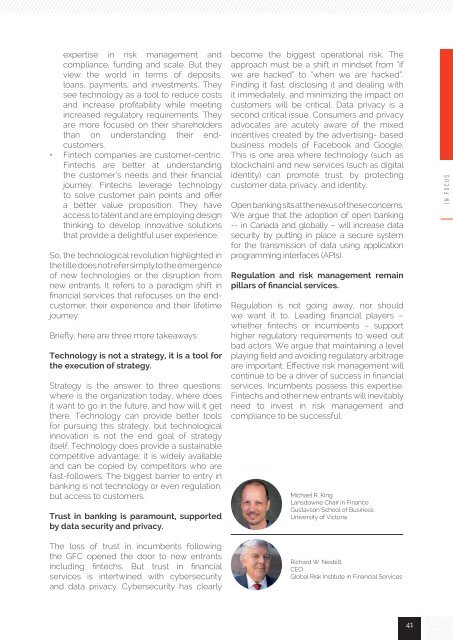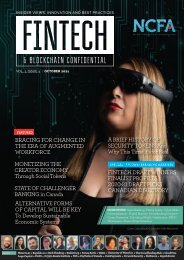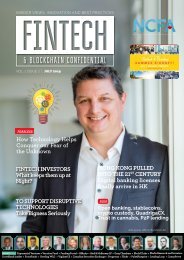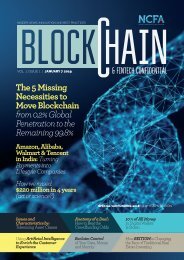NCFA Fintech Confidential December 2020 (Issue 3)
The National Crowdfunding & Fintech Association of Canada (NCFA) and partners are excited to present Vol. 1 Issue 3, FINTECH CONFIDENTIAL, a digital pop-up of the 6th annual 2020 Fintech & Financing Conference and Expo (FFCON20) held virtually across themed 8 weeks from July 9 to August 27 and co-hosted by NCFA and Toronto Finance International. The main theme of FFCON20 was “RISE”, reflecting the joint efforts of the two associations, NCFA and TFI, to build and increase the success and sustainability of Canada’s fintech and financial sector. There were many moving parts this year and a brand-new digital format with the event bringing together 100+ thought leaders, 50+ partners, and more than 500 attendees, 2 challenges and the inaugural Fintech Draft pitching and demo competitions. Congratulations to the winners: SolidBlock and MazumaGo (formerly DivDot)! Thanks to all the partners, speakers, attendees, volunteers and the entire organizing team for making FFCON20 an impactful and amazing online experience for Canada’s fintech and funding community. We hope you enjoy this issue of Fintech Confidential magazine – it certainly makes for great holiday reading! While everyone relentlessly strives to achieve success in 2021, we encourage you to bring in the new year with good health and to be mindful that we are all in this together, and to help others in your community more than ever before. Peace, happiness, and best wishes for an incredible year and journey ahead.
The National Crowdfunding & Fintech Association of Canada (NCFA) and partners are excited
to present Vol. 1 Issue 3, FINTECH CONFIDENTIAL, a digital pop-up of the 6th annual 2020 Fintech & Financing Conference and Expo (FFCON20) held virtually across themed 8 weeks from July 9 to August 27 and co-hosted by NCFA and Toronto Finance International.
The main theme of FFCON20 was “RISE”, reflecting the joint efforts of the two associations, NCFA and TFI, to build and increase the success and sustainability of Canada’s fintech and financial sector. There were many moving parts this year and a brand-new digital format with the event bringing together 100+ thought leaders, 50+ partners, and more than 500 attendees, 2 challenges and the inaugural Fintech Draft pitching and demo competitions. Congratulations to the winners: SolidBlock and MazumaGo (formerly DivDot)! Thanks to all the partners, speakers, attendees, volunteers and the entire organizing team for making FFCON20 an impactful and amazing online experience for Canada’s fintech and funding community.
We hope you enjoy this issue of Fintech Confidential magazine – it certainly makes for great holiday reading! While everyone relentlessly strives to achieve success in 2021, we encourage you to bring in the new year with good health and to be mindful that we are all in this together, and to help others in your community more than ever before. Peace, happiness, and best wishes for an incredible year and journey ahead.
Create successful ePaper yourself
Turn your PDF publications into a flip-book with our unique Google optimized e-Paper software.
expertise in risk management and<br />
compliance, funding and scale. But they<br />
view the world in terms of deposits,<br />
loans, payments, and investments. They<br />
see technology as a tool to reduce costs<br />
and increase profitability while meeting<br />
increased regulatory requirements. They<br />
are more focused on their shareholders<br />
than on understanding their endcustomers.<br />
• <strong>Fintech</strong> companies are customer-centric.<br />
<strong>Fintech</strong>s are better at understanding<br />
the customer’s needs and their financial<br />
journey. <strong>Fintech</strong>s leverage technology<br />
to solve customer pain points and offer<br />
a better value proposition. They have<br />
access to talent and are employing design<br />
thinking to develop innovative solutions<br />
that provide a delightful user experience.<br />
So, the technological revolution highlighted in<br />
the title does not refer simply to the emergence<br />
of new technologies or the disruption from<br />
new entrants. It refers to a paradigm shift in<br />
financial services that refocuses on the endcustomer,<br />
their experience and their lifetime<br />
journey.<br />
Briefly, here are three more takeaways:<br />
Technology is not a strategy, it is a tool for<br />
the execution of strategy.<br />
Strategy is the answer to three questions:<br />
where is the organization today, where does<br />
it want to go in the future, and how will it get<br />
there. Technology can provide better tools<br />
for pursuing this strategy, but technological<br />
innovation is not the end goal of strategy<br />
itself. Technology does provide a sustainable<br />
competitive advantage; it is widely available<br />
and can be copied by competitors who are<br />
fast-followers. The biggest barrier to entry in<br />
banking is not technology or even regulation,<br />
but access to customers.<br />
Trust in banking is paramount, supported<br />
by data security and privacy.<br />
become the biggest operational risk. The<br />
approach must be a shift in mindset from “if<br />
we are hacked” to “when we are hacked”.<br />
Finding it fast, disclosing it and dealing with<br />
it immediately, and minimizing the impact on<br />
customers will be critical. Data privacy is a<br />
second critical issue. Consumers and privacy<br />
advocates are acutely aware of the mixed<br />
incentives created by the advertising- based<br />
business models of Facebook and Google.<br />
This is one area where technology (such as<br />
blockchain) and new services (such as digital<br />
identity) can promote trust, by protecting<br />
customer data, privacy, and identity.<br />
Open banking sits at the nexus of these concerns.<br />
We argue that the adoption of open banking<br />
-- in Canada and globally – will increase data<br />
security by putting in place a secure system<br />
for the transmission of data using application<br />
programming interfaces (APIs).<br />
Regulation and risk management remain<br />
pillars of financial services.<br />
Regulation is not going away, nor should<br />
we want it to. Leading financial players –<br />
whether fintechs or incumbents – support<br />
higher regulatory requirements to weed out<br />
bad actors. We argue that maintaining a level<br />
playing field and avoiding regulatory arbitrage<br />
are important. Effective risk management will<br />
continue to be a driver of success in financial<br />
services. Incumbents possess this expertise.<br />
<strong>Fintech</strong>s and other new entrants will inevitably<br />
need to invest in risk management and<br />
compliance to be successful.<br />
Michael R. King<br />
Lansdowne Chair in Finance<br />
Gustavson School of Business<br />
University of Victoria<br />
IN FOCUS<br />
The loss of trust in incumbents following<br />
the GFC opened the door to new entrants<br />
including fintechs. But trust in financial<br />
services is intertwined with cybersecurity<br />
and data privacy. Cybersecurity has clearly<br />
Richard W. Nesbitt<br />
CEO<br />
Global Risk Institute in Financial Services<br />
41






